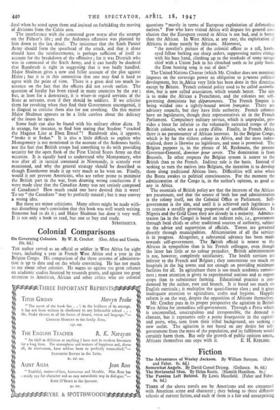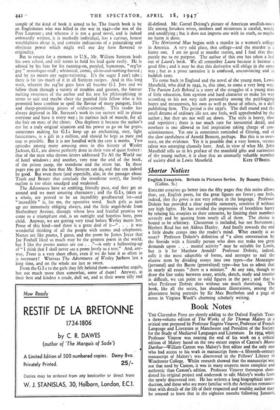Fiction
8s. 6d.)
THREE of the above novels are by Americans and are concerned with American scene and character • they belong to three different schools of Current fiction, and each of them is a fair and unsurprising sample of the kind of book it aimed to be. The fourth book is by an Englishman who was killed in the war in 1942—the son of the Poet Laureate ; and whereas it is not a good. novel, and is indeed awkwardly written, it is markedly individual, has a curious, honest watchfulness about it, and contains indications of a painstaking and obstinate power which might well one day have flowered to originality.
But to return for a moment to U.S., Mr. William Saroyan leads his own school, and still seems to hold his lead quite easily. He is adored by his fans for his running-on, puzzled, humorous, "reg'lar guy " monologue-stuff ; whimsical, comic, all-in-and-nothing-barred ; and by no means any sugar-rationing. It's the sugar I can't take ; there is far too much of it in all Saroyan recipes. And in this long work, wherein the reg'lar guys have all become G.I. Joes and we follow them through a variety of troubles and gaieties, the forever melting sweetness of the author and his zest for philosophising in terms to suit and maybe cheer the puzzled little fellow who is his perennial hero combine to spoil the flavour of many pungent, fresh and sharp-promising pieces of soldier-comedy. This reader has always deplored in Mr. Saroyan's work its too earnest will to please everyone and have it every way ; its curious lack of muscle, for all the hair on most of the chests. One deplores it because the author's eye for a truly original situation and his power to go on for pages, sometimes making his G.I.s keep up an enchanting, easy, light farcicalness, is a gift in a million, and should be kept as pure and taut as possible. But it is not handled with the care it merits. Two episodes among many amusing ones in this history of Wesley Jackson, G.I., are almost perfectly done in their vein of quiet foolery : that of the man who throws letters addressed To All the World out of hotel windows ; and another, very near the end of the book, of the prison camp, the trombone and the straw hat. k these pages you get the best that Mr. Saroyan can do, and that can indeed be good. But even there (and especially, alas, in the passages about Truth and Beauty that conclude the trombone story), the lovely outline is too often smudged and weakened.
The Adventures have an ambling, friendly pace, and they get us around and we meet amusing characters ; and the G.I.s, taken as a whole, are proved to be an incredibly goodhearted lot—and " incredibly " is, for me, the operative word. Such girls as turn up are immensely obliging always, and the little angel-bride from Shaftesbury Avenue, through whose love and fruitful promise we come to a triumphant end, is an outright and hopeless bore, poor child. Anyway, we are getting very tired before Wesley meets her. Prose of this kind—and there is a great deal of it—" . . . it was wonderful thinking of all the people with names and telephones. Names are like poems, I guess, and the poem by James Joyce that Joe Foxhall liked so much may be the greatest poem in the world, but I like the poems names are too . , ."—is only a ballooning-up of' I think that I shall never see a poem lovely as a tree." And, any- way, Trees is a very short effort, even if we do hear it as often as is necessary! Whereas The Adventures of Wesley 7ackson last a long time, and on the whole are just as sweet. From the G.I.s to the girls they left behind them—somewhat angels, but not much more than somewhat, some of them! Anyway, at their best and kindest a crude, dull set, and at their worst silly and ill-defined. Mr. Come' Dejong's picture of American smallish-tows life among forsaken wives, mothers and mistresses is careful, wordy and unedifying ; but it does not impress one with its truth, so maybe no harm is done.
The Horizontal Man begins with a murder in a women's college in America. A very odd place, that college—and the murder is a funny one. I am no good at murder stories, and I find that they puzzle me to no purpose. The author of this one has taken a leaf out of Laura's book. We all remember Laura because it became a good film ; and it may be that this derivative will oblige in the same way - but as a prose narrative it is confused, unconvincing and in
baddish taste. .
To come back to England and the novel of the young man, Lewis Masefield, who died in 1942, is, this time, to come a very long way. The Passion Left Behind is a story of the struggles of a young man of little education, firm egotism and hard character to make his way according to his not very rich personality among the pettifogging hopes and meannesses, his own as well. as those of others, in a du!! publishing firm. The period is the 1930's. The dull round and the small dreams of ordinary iife are, one feels, well apprehended by the author ; but they are not well set down. The style- is heavy, slow and repetitive ; there is too much tare for inessential detail, and nowhere is one allowed to feel inspiration taking charge of con- scientiousness. Yet one is sometimes reminded of Gissing, and of the slow carefulness of Arnold Bennett, perhaps. But this is to over- state, on the evidence. Yet it is possible that a very honest, serious talent was emerging clumsily here. And, in view of what-Mr. John Masefield tells us in his preface of the manifold gifts and curiosities of the young author, it is clear that an unusually valuable member of society died in Lewis Masefield. KATE O'BRIEN.



































 Previous page
Previous page